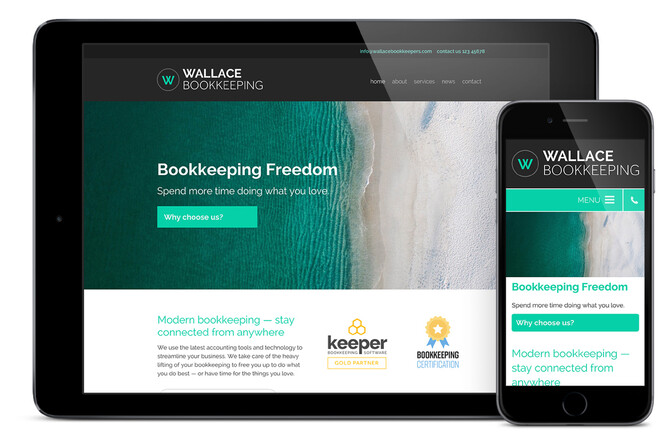So, you’re a qualified bookkeeper, a proven performer in the industry. Does your website convey that? Does it clearly communicate the professional standard you offer? And, most importantly, does it convert your website visitors into leads and new clients? Here’s a few things to think about to make your website work hard for you.
The world of websites can be a challenge but if you do the basics well you can set yourself apart from the crowd with a great website. In this guide we cover off the essentials for an effective bookkeeper website in plain language.
Supercharged word-of-mouth
Most of a bookkeeper’s business comes from word-of-mouth referrals. I conducted an informal audience survey when I was presenting at a recent ICB summit and found that word-of-mouth was by far the largest source of new business for bookkeepers. Many of your website visitors are there because they’re looking specifically for you, by name. Your word of mouth referrals will need to know a bit about you before they’re willing to make contact. So even if there’s a lot of positive buzz about your business, you still need a website that communicates who you are and that looks razor-sharp.
First impressions last
Is your site dull, boring, confusing? You only have a few seconds to engage a potential client sufficiently to ensure they browse your website deeper. So first impressions really matter. Make your website visually interesting. Learn how to wow your site visitors within seconds.
Show off a little
Once you’ve made that positive first impression, you need to build on it by showing the user why they should choose you. As a qualified bookkeeper you’ve got proven credentials. Make sure that your qualification is clearly communicated. Feature the relevant bookkeeper qualification logos on your site and mention any other endorsements you may have such as being a Xero certified advisor. In our bookkeeper website templates we’ve included placeholder logos as a prompt for you to add your own. It’s also helpful to mention on your website any areas of specialisation that you have. That’s not being a show-off. That’s instilling trust, reassuring potential clients that you can handle their bookkeeping needs professionally.
Make it real: showcase your team and tell your story
Images matter—a lot. Studies have shown that using real photos of smiling people can have a significant positive impact on conversion rates. Remember, your word-of-mouth referrals are there to learn about you, so it makes sense to show them your face. Find out more about using quality images here.
Many bookkeepers we speak to are reluctant to show a picture of themselves but it really does work. By investing in getting a few great photos taken you can keep the design of your site very simple.
Give away a little of your expertise
Sharing a little of your expertise is a great way to attract potential clients. For instance, say a small business owner is searching for tips about how to bolster cash flow in her fledgling startup. If your site is where she finds the answer, chances are she’ll see what else you have to offer—she might eventually become a client. Blogging let's you share a little of your expertise so you can draw people into your website—and into your clientbase. Learn more about the importance of blogging here.
Break your content up into manageable chunks
It’s important you don’t overwhelm your site visitors with screeds of endless text. Make your content easy to skim-read by using headings frequently and keeping your paragraphs short. Granted, webpages with lots of words often ranks well in search engines, but you need to balance that reality out with the equal, and often more important, reality that people often want to be able to get the key information at a glance. One way to break your content up into manageable pieces is by layering it. For example, you might have a “Services” page that has a very brief summary of what services you offer, which then link to other pages with more detail. Check out how to create a services page without using dropdown menus.
Keep your website up-to-date
We get it. You're busy running your practice and updating your website is the last thing on your mind. But, believe us, keeping your website up-to-date is an important part of making a good first impression—and maintaining it. Click here to find out why keeping your website content fresh is so crucial.
Chances are you already have a great body of content for your blog in emails you’ve sent to clients. For example, perhaps you’ve provided some guidance about where to get advice on auto-enrollment. Take the email content you provided and turn it into a blog post.
Look your best on every device
Let's say friends are discussing bookkeepers at a summer barbecue. There's a good chance that when your name comes up in the conversation, a potential client will pull out their smartphone and check you out right there and then. So it's important your site looks tip-top, no matter if it's being viewed on a phone, tablet or computer. Here’s why you need a website optimised for mobile devices.
Invite them to take action
Once you've engaged people online with your professional look, friendly team and helpful advice, it's important to get your site visitors to do something: call, email, or sign up for your newsletter. To do this, you need to create clear, strong calls-to-action. Make it easy for people to get in touch and create buttons that prompt them to contact you. Here is more information about creating calls-to-action on your website.
Make sure your website can be found on Google
Giving your website the best chance of ranking highly in search engine results for relevant search queries is called search engine optimisation (SEO). SEO is a very involved and long-term undertaking but, since most small businesses don’t do any SEO, even doing the SEO fundamentals can make a major positive impact on your search rankings. Get started on SEO basics here.
The top three essentials for bookkeeper websites
We hope this is a helpful guide for your bookkeeping practice website. We’ve seen amongst our bookkeeper clients that you do the basics well you can perform very well online.
If there were just three things to take away from this guide, we recommend:
- Introduce yourself and your expertise - it’s you people are looking for
- Have a photo of yourself - show that you are a real person
- Share your expertise in a blog - it shows that you know your stuff
If you’d like to create your own bookkeeper website with Rocketspark you can start a 30 day free trial of our website builder and sample our bookkeeper templates which provide an excellent starting point for creating a highly effective bookkeeper website.





